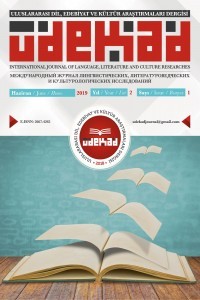OLGA LEBEDEVA’NIN ÇEVİRİLERİNDE DİNÎ MOTİFLERİN YERLİLEŞTİRİLMESİ (M. YU. LERMONTOV’UN İBLİS ESERİNİN TÜRKÇEYE ÇEVİRİSİ ÖRNEĞİNDE)
Bu makalede, Rus kadın oryantalistlerin öncüsü sayılan Olga Sergeyevna Lebedeva’nın uyguladığı çeviri stratejileri, kültürlerarası iletişimin bir yolu olarak yerlileştirme metodu bağlamında incelenmektedir. Makalenin amacı kültürel değerlerin, sembollerin ve normların yerlileştirme sürecindeki yerini ve rolünü analiz etmektir. Bu amaçla makalede, öncelikle Amerikalı çevirmen, teorisyen ve çeviri tarihçisi Lawrence Venuti’nin yerlileştirme yönteminin eksikliklerine dair hipotezleri tartışılmaktadır. Makalede, M. Yu. Lermontov’un İblis [Demon] adlı manzumesinin çevirisi incelenmekte ve dinî motiflerin hedef dile çevirilerinin ayrıntılı bir analizine yer verilmekte; kaynak ve hedef metinlerin karşılaştırmalı olarak incelenmesi yoluyla Lebedeva’nın çeviri anlayışının temel nitelikleri vurgulanmaktadır. Ortaya konulan özellikler, çevirmenin erek metnin -Venuti’nin terminolojisiyle- “saydamlığında” oynadığı rolün fark edilmesini mümkün kılmaktadır. Elde edilen verilerden hareketle makalenin sonuç bölümünde, dönemin siyasi, sosyal ve dinî koşullarının çeviri kararlarının alınmasında oynadığı role ilişkin görüşlere yer verilmektedir. Sonuçlar, ilk kadın şarkiyatçılardan Lebedeva’nın, Osmanlı-Türk toplumunun dinamiklerini başarıyla gözlemlediğini ve yerlileştirme stratejisini bilinçli bir şekilde kullanarak hedef kültürün yaşam tarzı ve geleneklerine dair derinlikli bilgisini okuyucuya sunduğunu ortaya koymaktadır.
Anahtar Kelimeler:
Olga Lebedeva, Lermontov, Demon, yerlileştirme, çevirmenin görünmezliği.
DOMESTICATION OF RELIGIOUS MOTIFS IN OLGA LEBEDEVA’S TRANSLATIONS (THE CASE OF THE TRANSLATION OF M. Y. LERMONTOV’S DEMON INTO TURKISH)
This study focuses on the translation strategies applied by Olga Sergeevna Lebedeva, the first female Russian orientalist, in the context of domestication. The objective of the study is to analyze the importance and role of cultural values, symbols, and norms in the process of domestication. In order to serve this objective the study examines American translator, theorist, and translation historian Lawrence Venuti’s current theories concerning the drawbacks of the domestication method. An analysis of the poem Demon by M. Y. Lermontov, which first appeared in Ottoman Turkish in 1891 and an in-depth review of the translations of religious motifs into the target language are presented in the research. The comparison of the original and translated texts highlights the main features of Lebedeva’s translation. The identified characteristics make it possible to recognize the significant role of the translator, according to Venuti’s terminology, in the “transparency” of the target text. Based on the data obtained, in the final part of the study, a number of assumptions are made about the possible role of political, social, and religious conditions of the era in making translation decisions. The conclusions illustrate that Lebedeva as an orientalist successfully observed the dynamics of the Ottoman Turkish society and, therefore, consciously used domestication to present the reader with her extensive knowledge of the lifestyle and conventions of the target culture.
Keywords:
Olga Lebedeva, Lermontov, Demon, domestication, translator’s invisibility.,
___
- Akün, Ö. F. (1996). Gülnar Hanım. TDV İslâm Ansiklopedisi 14. (s. 243-248). İstanbul: TDV Yayınları.
- Anoşkina, V. N. (2014). Demon. İ. A. Kiseleva (red. i sost.). M. Yu. Lermontov. Entsiklopediçeskiy slovar’. (s. 114-118). Moskva: İndrik.
- Argunşah, H. (2016). Kadın ve Edebiyat. Babasının Kızı Olmak. İstanbul: Kesit.
- Belinskiy, V. G. (1956). Polnoye sobraniye soçineniy. Pis’ma (1841-1848). Moskva: İzdatel’stvo Akademii nauk SSSR.
- Eyhenbaum, B. M. (2013). Lermontov kak istoriko-literaturnaya problema. M. Yu. Lermontov. (c. 725-754). SPb.: RKHGI.
- Habibullina, A. Z. (2014). Osobennosti vospriyatiya i perevodov proizvedeniy M. Yu. Lermontova v tyurkoyazyçnıh literaturah Rossii (k voprosu o mejliteraturnom dialoge). Filologiya i kul’tura, 2 (36), 197-201.
- Karaca, İ. (2013). Ahmet Mithat Efendi ve Madam Gülnar. Türk Dili ve Edebiyatı Dergisi, 46 (46), 55-72.
- Karaca, İ. (2015). On The Translations from Russian in Post-Tanzimat Era. Journal of Turkish Language and Literature, 51 (51), 79-93.
- Kostikova, O. İ. (2010). Perevodçeskaya kritika: «Prozraçnost’» vs «Zerkal’nost’». Vestnik Moskovskogo universiteta. Teoriya perevoda, (3), 41-54.
- Lermontov, M. Yu. (1983). Demon. C. Johnston. (Trans.). Narrative Poems by Alexander Pushkin and Mikhail Lermontov. (pp. 107-144). New York: Random House.
- Lermontov, M. Yu. (2014a). Sobraniye soçineniy. Poemı (1828-1841). SPb.: İzdatel’stvo «Puşkinskiy Dom».
- Lermontov, M. Yu. (2014b). İblis. K. Yükseler. (Haz. ve Çev.) Lermontov. Profil. (s. 72-112). İstanbul: Yapı Kredi.
- Lermontov, M. Yu. (2018). İblis. Madam Gülnar. (Çev.). Lermontov’un İblis Şiirinin Romanı. Semih Doğan (Haz.). İstanbul: Büyüyen Ay.
- Lermontov, M. Yu. (2019). İblis. A. Behramoğlu. (Çev.). Hançer. Seçme Şiir ve Manzumeler. (s. 67-109). İstanbul: İş Bankası.
- Olcay, T. (2017). Olga Lebedeva (Madame Gülnar): A Russian Orientalist and Translator Enchants the Ottomans. Slovo, 29 (2), 40-71.
- Oldjay, T. (2016). Poslannitsa russkoy kul’turı (iz interv’yu Alekseya Makeyeva). Russkiy mir, 3, 10-15.
- Peskov, A. M. - Turbin V. N. (1981). Demonizm. Lermontovskaya entsiklopediya. (s. 137-138). Moskva: Sovetskaya Entsiklopediya.
- Venuti, L. (1995). Translator’s Invisibility: A History of Translation. London and New York: Routledge.
- Venuti, L. (1998). Strategies of Translation. M. Baker. (Ed.). Routledge Encyclopedia of Translation Studies. (pp. 240-244). London and New York: Routledge.
- Başlangıç: 2018
- Yayıncı: Reşat ŞAKAR
Sayıdaki Diğer Makaleler
İKİNCİ YABANCI DİL OLARAK RUSÇA ÖĞRENEN ASKERÎ PERSONELE YÖNELİK RUSÇA ASKERÎ TEMEL SÖZ VARLIĞI
Vyaçeslav İvanov’un Bebeklik Adlı Eserinin Carl Gustov Jung’un Anne Arketipi Bağlamında İncelenmesi
Sivil İtaatsizlik ve Pasif Direniş Bağlamında Tolstoy ve Gandhi
Selîsî’nin Muamma Risalesi ve Muammeyatı
YABANCI DİL OLARAK RUSÇA EĞİTİMİNDE ÖZNESİZ CÜMLELERİN YAPISAL VE ANLAMSAL ÖZELLİKLERİ
